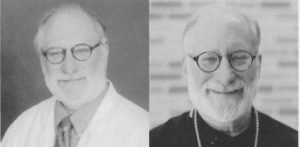This is the fourth in my series of articles published in the Evangelist, the print-only newsletter of St. John Orthodox Church in Memphis, Tennessee, in the 1900s and early 2000s. I asked Father Basil/Doctor Cushman to read these articles again—26 years after he wrote them—and tell me whether or not he still agreed with what he said in 1997. His response was that he probably knew more about these issues back then than he does now, because he was at the time chairman of the ethics committee at the VA Medical Center in Memphis, and was actively reading books on ethics by Orthodox theologians, like Father Stanley Harakas, who died in 2020, and wrote Wholeness of Faith and Life: Orthodox Christian Ethics (3-part series) and other books. But he still agrees with what he wrote in 1997.

Read the Article Here
Decisions About “Life-Sustaining” Medical Treatment: Part I
By Father William (aka Basil) Cushman, M.D.
June/July 1997, the Evangelist, newsletter of St. John Orthodox Church, Memphis, Tennessee
Sooner or later, if you haven’t already, you will be involved in a decision about “life-sustaining” medical treatment . . . either for a family member, someone close to you, or even for yourself. Especially because of the medical “advances” of the past thirty years, because it is often difficult for physicians to make an adequate prediction of prognosis of how someone will respond to treatment or even how one will do without treatment, these are often difficult decisions. As with many decisions in life, it is not necessarily a lack of faith, nor a sign of weakness, to prayerfully agonize over such decisions some of the time.
Our society tries to make us feel “comfortable” about these kinds of decisions and often institutionalizes the easy answers. For example, there is a growing popular movement not only to make it legal for you to enlist someone to end your life (euthanasia or, if a doctor “offs” you, physician-assisted suicide), but to make sure you feel guilty if you don’t ask for your life to be terminated before you have to suffer much or become a burden to anyone else! This is actually the reality in the Netherlands today, where physician-assisted suicide, although technically not legal, has nationally accepted stringent guidelines and “safeguards,” which are not surprisingly rarely followed when physicians “mercifully” kill patients.
But it is not just across the Atlantic Ocean . . . in a few weeks the *Supreme Court of the United States will render a decision about whether Americans have a constitutional right to be killed by some group of professionals on demand. By the way, most talk about this being a responsibility of physicians, but why should those who accept an obligation to “do no harm” be asked to be the executioners? If the Supreme Court declares assisted suicide on demand to be a constitutional right, then there will logically be no criteria, such as having a terminal illness or being free of judgment-altering depression, that can limit this right. In addition, the legal precedent is already in place for incompetent patients to have someone else decide for them that “it is time.”
The good news is that most “observers” believe this particular court will say something to the effect that asking to have a physician end one’s life is not a constitutionally guaranteed right, but they will likely not declare physician-assisted suicide unconstitutional either. So the battle will probably be fought in many state legislatures and courts.
*Note: On June 26, 1997, the United States Supreme Court unanimously rejected any constitutional right of terminally ill patients to physician-assisted suicide. You can read the article in the National Journal of Public Health from December of 1997 here.
Whatever the legal of cultural environment will be when we are faced with decisions about “life-sustaining” medical treatment, it is vital for Orthodox Christians to keep before us our judge . . . to whom we will give an answer for the decisions we make. God has created us in His image and likeness, restored us to Hid kind intentions through the Incarnation of the Son, our Lord Jesus Christ, which through baptism restores us to newness of life. We are not just restored in soul or spirit, but as a whole individual. Our bodies are the sacred “temples of God.” Thus the commandment “Thou shalt not kill” certainly applies to medical decisions that are made about life and death. How do we decide when that time has come? Well, it’s not always easy. We should become as informed as is possible and readily seek counsel from others in the faith, especially our pastor. Many parishioners at St. John have asked for information about “advanced directive,” “living wills,” “Life-sustaining treatment,” and so forth, so we began a discussion of these issues at the Adult Education class held on April 12, 1997.
Some of the information needed to make as wise a decision as possible is what we learn from the physicians at the time a decision may need to be made. We should try to get as clear a picture as possible about what the “medical indications” are—what is known about the diagnosis or medical situation, what are the reasonable treatment options (which may include no definitive treatment), what are the predicted outcomes with each alternative (prognosis), and what are the recommendations of the physicians. That does not mean we must accept a physician’s preferences, especially since his or her values and theology may be quite different from the Orthodox Church’s, or yours, but I believe it is a very important perspective to weigh. Certainly, this is the time to seek the priest’s perspective as well.
The law and ethical principles then give priority in medical decision-making to the patient, as long as he or she is an adult and capable of making an “informed” decision among the medically appropriate alternatives. We often call that “competence.” However, even if it is not a recommended option, our society and the history of the Church permit the individual to decide to forego medical treatment. For us to do this, however, we should carefully and prayerfully consider the medical situation. A greater difficulty arises when the individual is not competent to make a responsible medical decision. In the next Adult Education class on this subject and the next issue of the Evangelist, I will plan to discuss what can happen when someone is not capable of making a medical decision, what the various legally recognized “advanced directives” are, and offer some of my own recommendations on how to use these, including which ones are my preference.

Dr. Cushman has been Medical Director of University of Tennessee Clinical Health since June of 2020. He is also Professor, Department of Preventive Medicine. Dr. Cushman served for 44 years at the VA Medical Centers in Jackson, Mississippi and Memphis, Tennessee.
Father Basil Cushman has served as Associate Pastor at St. John Orthodox Church since 1988.
I will post Part II of this article in a few days.
